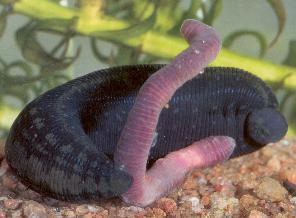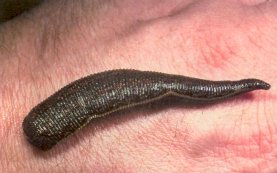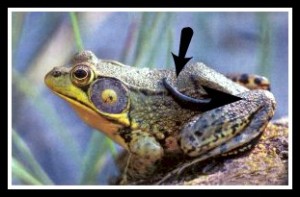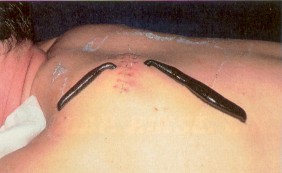Leeches: Are they Really That Dangerous?
 People frequently consult us for the presence or appearance of leeches in their water features. Do we need to be afraid of these little beasts? The following article will allow you to see a little more clearly and to understand the place of these little creatures. You’ll see, they really aren’t so terrifying!
People frequently consult us for the presence or appearance of leeches in their water features. Do we need to be afraid of these little beasts? The following article will allow you to see a little more clearly and to understand the place of these little creatures. You’ll see, they really aren’t so terrifying!
First of all, remember that there are nearly 700 different species of leeches on Earth. Although they are all carnivorous, they are not all haematophagous (blood-feeding). Many feed only on earthworms, molluscs, insect larvae and other small organisms that inhabit the aquatic environment. Among the species that love blood, few appreciate human blood. As proof, only one in Canada is voracious enough to hunt you when you put your little toe in the water: the medicinal leech of North America (Macrobdella decora). Other blood-feeding species will prefer frogs, snails, turtles and ducks. In Europe, the leeches that seek human blood are more numerous, the best known being Hirudo medicinalis, whose population over the last few centuries has suffered from medical practices to the point of becoming an endangered species today.

Since human blood is not always easy to find (few people dip their feet in water for the simple pleasure of feeding our friend M. decora), she sets her heart instead on the frogs that populate our ponds.
Here are a few solutions to help you control your leech populations:
- Solution 1: Introduce some bluegill fish, which will feed on leeches, IF their vision is not impeded by excessive vegetation.
- Solution 2: Make leech traps, which can be more or less successful.
- Solution 3: Limit the amount of food available for leeches, that is, frogs. This is the most efficient option according to our experience. Reduce frogs, reduce leeches.
Who eats frogs you ask? Small-mouthed bass eat frogs and tadpoles and they are suited to warmer pond water. Before you leap to the natural conclusion about fragile frog populations, introducing a few bass into your pond won’t eliminate all frogs, nor all leeches, it will simply  help control a problem situation. And bass tastes great on the barbecue!
help control a problem situation. And bass tastes great on the barbecue!
Leeches also tend to use the accumulation of muck and debris at the bottom of your pond as a habitat and hiding place from fish. The best way to banish leeches from your pond is to remove this habitat. Meticulous care in removing falling leaves and debris using an aquatic lake rake, adding muck digesting bacteria and making sure there is proper water circulation and or aeration, will deter leeches and with nowhere to hide, the leeches will be picked off by your fish population.
Leeches are a wonder of nature that deserves our admiration. To avoid attracting our attention and for efficient latching, the leech injects us with an anaesthetic and an anticoagulant. Even though they do not transport any disease, care (cleaning and covering site) must be taken after the leech detaches, since blood can continue to flow for up to 10 hours afterwards. Isn’t that amazing! So what are you to do when a hungry leech attaches onto your leg? Don’t panic! If you are patient, you can let the leech take breakfast (it never overeats!) then it will detach itself as quietly as can be, and go and hide at the bottom of the pond for weeks or months. Remember, you won’t feel any pain from the leech, only a heat sensation at the dinner site. Caution! Do not put salt or other poison on the leech while it is attached to your skin. This could cause the leech to regurgitate stomach contents and cause you to get an infection. Do not pull to remove it, as part of its mouth could remain in the wound and again cause an infection.
Leeches are not hated by everyone. Their analgesic, anaesthetic, and anticoagulant virtues have made many micro-surgeons happy; to such a point that a company in England specialises in the commercialization of these little critters.
So just remember, there is only one kind of leech in all of Canada that wants your blood, and if it finds you, it won’t hurt. In fact, it is inviting you to become part of its food chain. Just stock your pond with smallmouth bass, and eventually, you’ll get your blood back!
Happy pondering!
Related Articles: